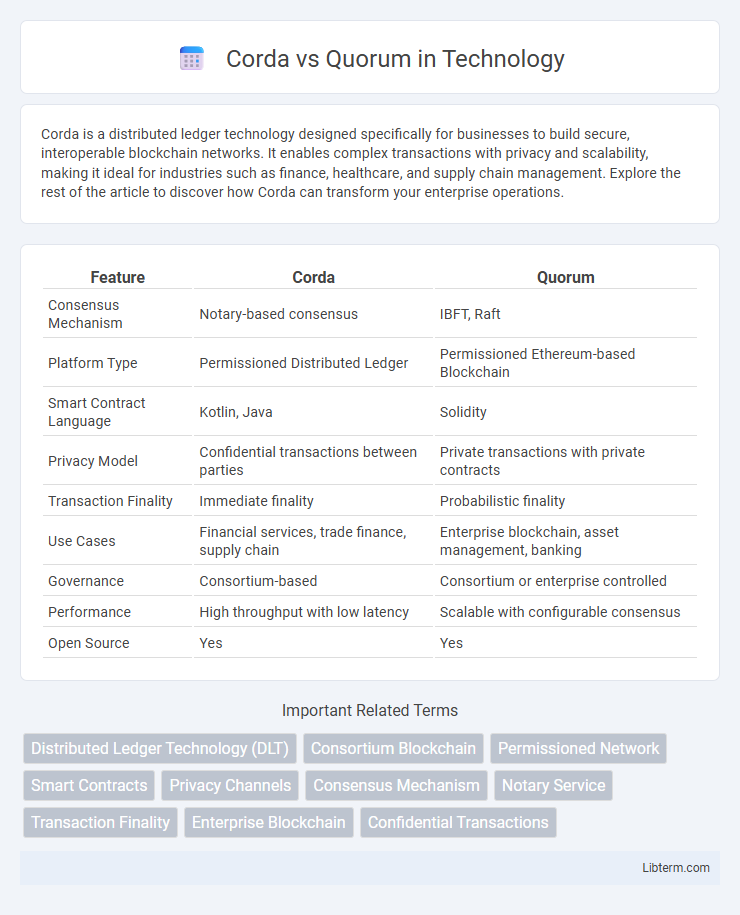Corda is a distributed ledger technology designed specifically for businesses to build secure, interoperable blockchain networks. It enables complex transactions with privacy and scalability, making it ideal for industries such as finance, healthcare, and supply chain management. Explore the rest of the article to discover how Corda can transform your enterprise operations.
Table of Comparison
| Feature | Corda | Quorum |
|---|---|---|
| Consensus Mechanism | Notary-based consensus | IBFT, Raft |
| Platform Type | Permissioned Distributed Ledger | Permissioned Ethereum-based Blockchain |
| Smart Contract Language | Kotlin, Java | Solidity |
| Privacy Model | Confidential transactions between parties | Private transactions with private contracts |
| Transaction Finality | Immediate finality | Probabilistic finality |
| Use Cases | Financial services, trade finance, supply chain | Enterprise blockchain, asset management, banking |
| Governance | Consortium-based | Consortium or enterprise controlled |
| Performance | High throughput with low latency | Scalable with configurable consensus |
| Open Source | Yes | Yes |
Introduction to Corda and Quorum
Corda, developed by R3, is an open-source blockchain platform designed for business applications requiring privacy, scalability, and interoperability across complex networks. Quorum, built by JPMorgan Chase and based on Ethereum, focuses on enhancing transaction privacy and performance within permissioned enterprise environments. Both platforms prioritize secure, efficient distributed ledger technology tailored for financial and commercial use cases.
Core Architecture Comparison
Corda employs a unique notary service and state objects to ensure transaction finality and privacy, leveraging a point-to-point communication model that restricts data visibility to relevant parties only. Quorum, built on Ethereum, utilizes consensus mechanisms such as Istanbul BFT and Raft for transaction validation, supporting both public and private transactions with smart contract compatibility. While Corda's architecture emphasizes privacy through transaction notarization and contract states, Quorum integrates on-chain/on-ledger privacy techniques with permissioned network features to balance transparency and confidentiality.
Consensus Mechanisms
Corda employs a unique consensus mechanism based on notary nodes that achieve consensus on transaction uniqueness and ordering without requiring global broadcast, enhancing scalability and privacy. Quorum utilizes Istanbul Byzantine Fault Tolerance (IBFT) and Raft consensus algorithms, offering rapid finality and fault tolerance in permissioned blockchain environments. The contrast lies in Corda's emphasis on selective transaction validation versus Quorum's emphasis on fault-tolerant consensus across all nodes.
Privacy and Data Confidentiality
Corda employs a unique notary service and point-to-point communication to ensure transaction privacy by restricting data visibility to involved parties only. Quorum enhances data confidentiality using private transaction managers and private smart contracts, enabling selective data sharing within a permissioned network. Both platforms prioritize privacy but Corda's approach is more granular, catering specifically to complex financial agreements requiring stringent data isolation.
Smart Contract Capabilities
Corda employs Contract States and Contract Code written in Kotlin or Java, enabling complex and legally enforceable smart contracts with fine-grained control over transaction verification. Quorum, built on Ethereum, leverages Solidity-based smart contracts, offering compatibility with the vast Ethereum ecosystem and supporting private transactions through enhanced privacy features. Both platforms provide robust smart contract capabilities tailored for enterprise use cases, but Corda focuses on transaction-level privacy and legal compliance while Quorum emphasizes Ethereum compatibility and flexible privacy controls.
Network Governance and Permissions
Corda employs a permissioned network model with flexible governance structures tailored to enterprise use cases, enabling node identity verification and transaction privacy through notary services and contract constraints. Quorum, built on Ethereum, uses a permissioned network with customizable access controls managed by a central authority or consortium, enforcing explicit permissions for participating nodes and transaction types via smart contracts. Both platforms emphasize fine-grained access control and secure transaction validation, but Corda's governance is decentralized through multiple stakeholders, whereas Quorum often relies on predefined governance policies within its consortium framework.
Integration and Interoperability
Corda excels in integration by offering developer-friendly APIs and connectors tailored for enterprise systems, enabling seamless workflows with existing financial and supply chain platforms. Quorum provides robust interoperability through its Ethereum-based architecture, supporting public and private transaction configurations that facilitate cross-chain interactions and integration with decentralized applications. Both platforms prioritize scalable interoperability, with Corda leveraging the Corda Network for inter-organizational communication and Quorum utilizing Ethereum's extensive tooling ecosystem to enhance connectivity.
Performance and Scalability
Corda demonstrates high throughput capabilities with transaction finality achieved in seconds, optimized for complex workflows and enterprise use cases. Quorum, built on Ethereum, offers faster transaction processing through private and permissioned consortium chains, excelling in scalability with efficient consensus mechanisms like Istanbul BFT and Raft. Both platforms provide robust performance, but Corda's architecture favors transactional privacy while Quorum supports broader scalability across decentralized applications.
Use Cases and Industry Adoption
Corda excels in financial services and trade finance by enabling secure, transparent, and efficient cross-institutional workflows, with major adoption by banks and insurance firms such as HSBC and ING. Quorum, built on Ethereum, is favored in supply chain management and asset tokenization, with notable use in enterprises like JPMorgan and Microsoft for private transactions and smart contract applications. Industry adoption reflects Corda's strength in regulated sectors requiring privacy, while Quorum suits environments needing public blockchain compatibility with enterprise-grade privacy features.
Choosing Between Corda and Quorum
Choosing between Corda and Quorum depends largely on the specific requirements of enterprise blockchain applications. Corda excels in scenarios needing strict privacy controls and complex workflow automation, leveraging its unique notary services and transaction validation processes. Quorum offers high throughput and enhanced privacy features suited for financial applications requiring permissioned networks and integration with Ethereum-based smart contracts.
Corda Infographic

 libterm.com
libterm.com